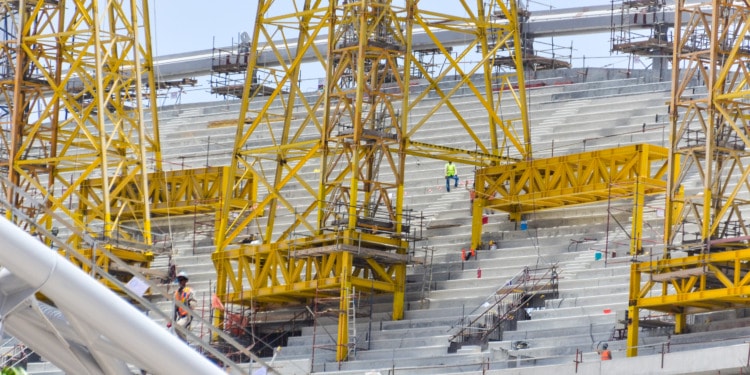A group of almost 40 workers involved in the construction of stadiums for the 2022 FIFA World Cup in Qatar has taken legal action against a US construction company over working conditions.
The plaintiffs, all from the Philippines, are accusing the company of negligence and unjust enrichment as well as of breaking American law prohibiting trafficked or forced labor, even outside of the US.
They say that they were forced to work up to 72 consecutive hours in extreme heat, without food and water, and that the construction company, Jacobs Solutions, knew or should have known about the abuses and chose to ignore them.
They also allege that they were not fully compensated and that their passports had been taken away, effectively preventing them from seeking new employment or returning to their home country.
The plaintiffs filed their complaint on October 12, in a federal court in Denver, Colorado, and are reportedly seeking “unspecified damages.”

Qatar had already been under intense scrutiny from human rights organizations due to its treatment of migrant workers well before this lawsuit. In the run-up to the 2022 World Cup, reports emerged of thousands of workers purportedly losing their lives and tens of thousands sustaining injuries during the construction of stadiums for the tournament.
According to an analysis by the Guardian, conducted in early 2021, over “6,500 migrant workers from India, Pakistan, Nepal, Bangladesh and Sri Lanka had died in Qatar since the award of the tournament.”
A year earlier, in 2020, the International Labour Organization (ILO) observed 50 work-related deaths, 500 serious injuries, and 37,600 mild to moderate injuries that year alone.
Related articles: World Cup 2022 Host Qatar Is Riddled With Climate and Human Rights Issues | World Cup Kick-Off in Qatar: After 15,021 Migrant Lives Lost, How Can We Just “Focus on the Football”?
While the Qatari government contends that the number of worker fatalities and injuries is significantly lower than reported, in 2020 the country implemented labor reforms that set a higher and non-discriminatory minimum wage for migrants — for the first time — and allowed them to change jobs without permission from employers.
But the reforms, according to Human Rights Watch, have proven to be “woefully inadequate in protecting workers’ rights and are poorly enforced.”
“Migrant workers continue to face wage abuses and exorbitant recruitment fees. Migrant worker deaths are rarely investigated, and families of deceased migrant workers often do not receive compensation from employers,” Human Rights Watch explains, concluding:
“Despite the global scrutiny brought by the FIFA World Cup 2022 and the call for FIFA and Qatari authorities to remedy serious abuses against migrant workers, the tournament ended without compensation, including to families of deceased migrant workers who made the tournament possible.”
Editor’s Note: The opinions expressed here by the authors are their own, not those of Impakter.com — In the Featured Photo: Renovation of the Khalifa Interational Stadium, Doha, Qatar (roof & cooling). Featured Photo Credit: jbdodane/CC BY-NC 2.0









